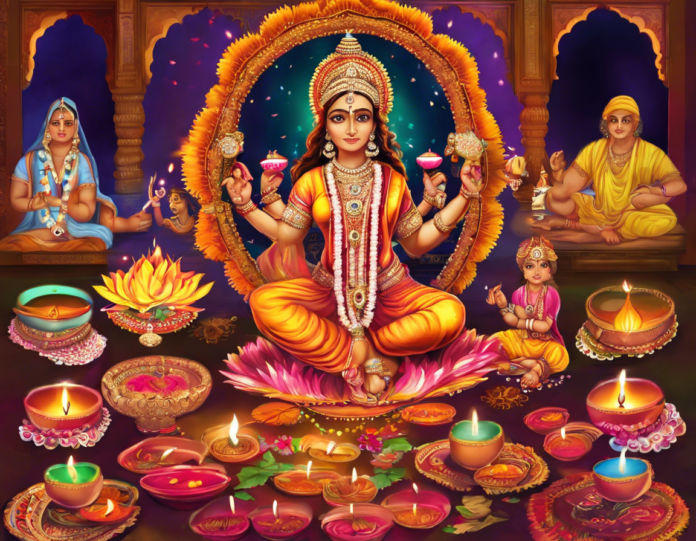Diwali, also known as the “Festival of Lights,” is one of the most significant festivals in the Hindu calendar. Celebrated by millions of people across the world, Diwali signifies the victory of light over darkness, good over evil, and knowledge over ignorance. One of the key aspects of Diwali celebrations is the performance of Diwali Puja, a traditional ritual that holds immense spiritual significance.
Diwali Puja Timing
Diwali falls on the darkest night of the Hindu Lunisolar month of Ashwin, which typically falls in October or November. The timing of Diwali Puja is crucial as it is believed that performing the ritual during specific auspicious hours yields maximum benefits. The most auspicious time for Diwali Puja is during the Pradosh Kaal, which is the time window around sunset. This period is considered ideal for invoking the blessings of the deities and seeking their divine grace.
Diwali Puja Rituals
Diwali Puja is a comprehensive ritual that involves several steps aimed at invoking the blessings of various deities and seeking prosperity, happiness, and well-being for the family. Here is a step-by-step guide to performing Diwali Puja:
Preparation:
– Clean the house thoroughly and decorate it with rangoli, lights, and diyas.
– Arrange the puja items like a kalash, idols or images of deities, incense sticks, lamps, fruits, flowers, sweets, and offerings like coconut and betel leaves.
– Prepare a sacred space for the puja, facing east or north.
Ganesh Puja:
– Begin the puja by invoking Lord Ganesha, the remover of obstacles, and seek his blessings for a successful and obstacle-free puja.
Lakshmi Puja:
– Invoke Goddess Lakshmi, the deity of wealth and prosperity, and offer prayers, flowers, and sweets to seek her blessings for abundance and prosperity.
Kuber Puja:
– Worship Lord Kuber, the treasurer of wealth, and seek his blessings for financial stability and abundance.
Saraswati Puja:
– Offer prayers to Goddess Saraswati, the deity of knowledge and wisdom, seeking her blessings for academic success and enlightenment.
Aarti and Prasad:
– Conclude the puja by performing aarti, singing hymns, and offering prasad to the deities.
– Distribute the prasad among family members and guests as a symbol of divine blessings.
Significance of Diwali Puja
Diwali Puja holds immense significance in Hindu culture and is believed to bring prosperity, happiness, and well-being to the household. By invoking the blessings of various deities, devotees seek protection from negative energies, success in their endeavors, and fulfillment of their wishes and desires. The lighting of diyas and lamps during the puja is symbolic of illuminating the inner self and dispelling ignorance and darkness.
FAQs about Diwali Puja:
Q1: Can Diwali Puja be performed by anyone, regardless of their religious beliefs?
A1: Yes, Diwali Puja can be performed by anyone who wishes to seek prosperity, happiness, and well-being. The rituals and prayers are not restricted to followers of a particular faith.
Q2: What are the essential items required for performing Diwali Puja?
A2: The essential items for Diwali Puja include a kalash, idols or images of deities, incense sticks, lamps, fruits, flowers, sweets, and offerings like coconut and betel leaves.
Q3: What is the significance of lighting diyas during Diwali Puja?
A3: Lighting diyas during Diwali Puja symbolizes the victory of light over darkness, knowledge over ignorance, and good over evil. It is believed to dispel negativity and bring positivity into the household.
Q4: Can Diwali Puja be performed at any time during the day?
A4: It is advisable to perform Diwali Puja during the Pradosh Kaal, which is the time window around sunset, as it is considered the most auspicious time for the ritual.
Q5: What is the importance of offering prasad during Diwali Puja?
A5: Offering prasad to the deities and distributing it among family members symbolizes the sharing of divine blessings and seeking prosperity and well-being for all.
In conclusion, Diwali Puja is a sacred ritual that holds immense spiritual significance for millions of people around the world. By following the traditional customs and procedures of the puja, devotees seek the blessings of various deities for prosperity, happiness, and well-being in their lives. The symbolism of light, knowledge, and positivity associated with Diwali Puja makes it a powerful and transformative spiritual practice for individuals and families.


Recent comments